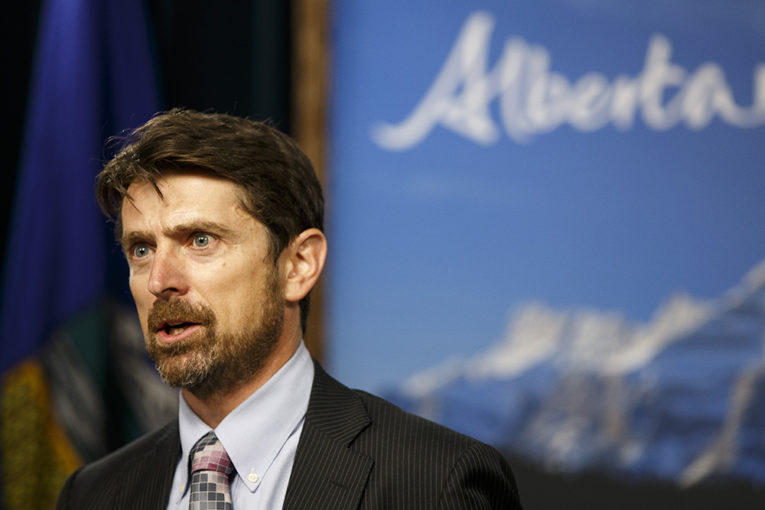
The circumstances surrounding the appointment of anti-Alberta oil activist Ed Whittingham to the Alberta Energy Regulator are even more troubling than initially believed.
Whittingham, the former executive director of the Pembina Institute from 2011 to 2017, was appointed to the five-year, part-time, quasi-judicial AER board on Feb. 12 by Alberta Energy Minister Marg McCuaig-Boyd.
As a board member, Whittingham is one of the bosses of the AER’s interim president and CEO, Gordon Lambert. The problem with that is Whittingham and Lambert are co-founders and business partners of Academy for Sustainable Innovation (ASI).
If that sounds overly cosy, it is.
As an AER media relations person stated in an email: “AER directors are part-time members of a governance board who . . . approve regulatory changes and set performance expectations for our organization and CEO.”
They also, apparently determine the remuneration of the president and CEO.
Jonathan Denis, a lawyer and former attorney general of Alberta under former premier Alison Redford, said there are problems with the appointment.
“In my profession,” said Denis, a partner with Guardian Law in Calgary, “the Law Society requires us not just to avoid a conflict of interest but the perception of a conflict of interest, and that’s the same test that I would probably want to apply to this appointment. Is there a perceived conflict of interest?” he asked.
One AER employee, who has asked to remain anonymous, wondered what would happen if Whittingham convinces the rest of the board to increase the salary of Lambert, his business partner, at a time when their company is struggling financially in an effort to shore up their business interests?
“It’s a hypothetical, but it’s possible,” said the employee, who did hope that Whittingham might have some input into improving what he called the “toxic” work culture at the AER.
“Of all the people who qualify to be a director here, they pick someone who has opposed absolutely every pipeline, every oil and gas project, even LNG, and to top it all off he is responsible for assessing and evaluating his buddy and business partner? Honestly, I don’t get it.”
Can anyone?
Here we have a provincial government trying desperately of late to prove that it is pro-pipeline and it appoints a highly effective, foreign-funded, anti-Alberta pipeline activist to the AER who has at least a perceived conflict of interest.
Whittingham did not agree to numerous interview requests over many days.
But an AER spokesperson replied to interview requests from Postmedia with an email that said: “The AER does not appoint directors to the board, they are appointed by the Government of Alberta. All AER employees, hearing commissioners and board directors, including the CEO, are subject to our code of conduct. All AER directors go through a conflict of interest screening and assessment. Any potential conflicts are identified and, if a conflict exists, mitigating actions are taken. At the beginning of every board meeting, each board member is required by the Chair to identify any potential conflicts. If there is a conflict, a board member declares it, and recuses (themselves) from that item. These conflicts are officially documented in the AER board minutes.”
Mike McKinnon, a spokesman for McCuaig-Boyd, acknowledged that all AER directors go through a conflict of interest screening process.
“We find the ongoing character assassination of two people who are well respected in the energy sector to be unfortunate,” said McKinnon. “They, like our premier, agree that we can grow and diversify our economy while creating good oil and gas jobs and protecting the environment.”
How pointing out the facts — that during Whittingham’s time working at the Pembina Institute it accepted $8 million of U.S. foundation money earmarked to “landlock” Alberta oil and gas through the highly successful Tar Sands Campaign — can be called “character assassination” is a mystery. If anyone or anything has suffered character assassination, it’s Alberta’s energy industry and the men and women who work in it.
Tristan Goodman, president of the Explorers and Producers Association of Canada, said “we are confused by the appointment. It doesn’t seem grounded in the history of the regulator.
“There are various ways you can structure a board, but I think it’s important to either remain very technical or at least without a perception of bias,” said Goodman, who was previously the senior vice-president of the industry operations branch at the AER.
“The AER is supposed to function by law without a perception of bias,” added Goodman.
Cody Battershill, the founder of Canada Action, the group that holds those uber polite pro-oil-and-gas rallies, says Whittingham is not really opposed to oil and gas and pipelines, he’s only opposed to Alberta oil, gas and pipelines.
“What Pembina has done is they’re opposed to Keystone XL but they’re not talking about other heavy oil imports coming into the U.S.,” said Battershill.
“They’re opposed to the Energy East pipeline, but they’re not opposing all of the oil that Canada imports from countries that don’t have carbon regulations. They’re opposed to Northern Gateway pipeline but they’re not talking about Alaskan oil tankers on the West Coast. I have not seen anything where they mention that Canada is the only top-10 oil exporter with carbon pricing,” said Battershill.
“Mr. Whittingham is not balanced or fair in his views toward Alberta, so his appointment doesn’t balance the AER board, it skews it.”
And now there’s a conflict, too, and his five-year appointment comes just weeks before a provincial election campaign. If a new Alberta government boots him from the board, will he get a hefty severance? So far, the Alberta government won’t say.
Licia Corbella is a Postmedia opinion columnist.
You can read more of the news on source
